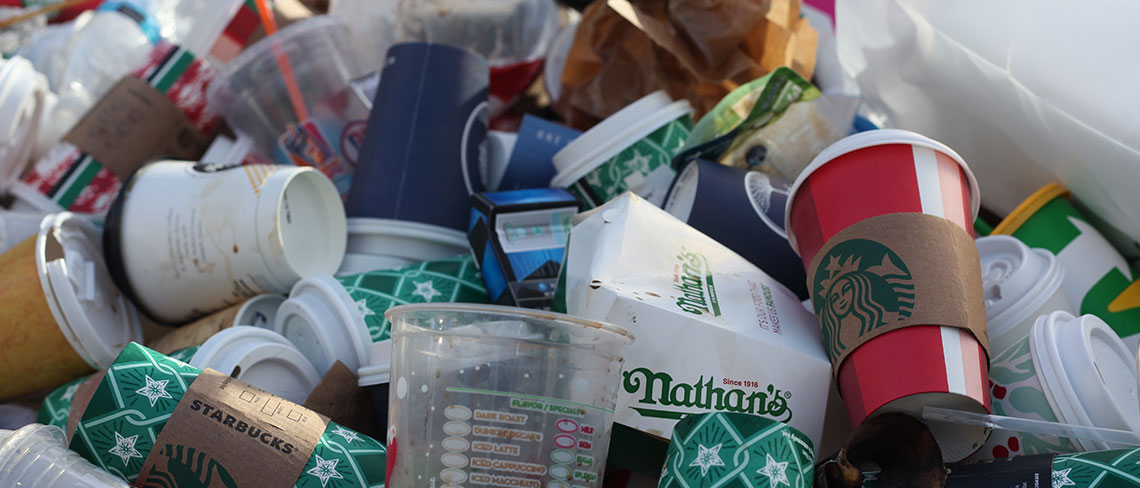
- David McLagan claims that consumer behaviour MUST change
- Reusable rather than recyclable is the ONLY way to tackle the issue of waste
- Over 100 billion single use cups go to landfill each year globally. Hugh’s estimate of 2.5 of billion in UK must be considered in this context
Following Hugh Fearnley Whittingstall’s BBC News Viewpoint piece on the coffee cup waste crisis this week, and the airing of Episode 3 of his War on Waste series taking on coffee shop giants Starbucks, Costa and Caffè Nero last night, David McLagan, Founder & CEO of revolutionary new reusable and biodegradable coffee cup brand, Ecoffee Cup, pitches in to emphasise the need to focus on changing consumer behaviour rather than holding out for the big coffee corporations to effect change.
“In his War on Waste campaign, Hugh estimates that 2.5 billion single-use cups per year go to landfill in the UK. But the problem is much bigger when we look beyond Britain…
With estimates of up to half a trillion manufactured, globally, over 100 billion single-use cups go to landfill each year. Starbucks, in the US alone, serves 8,000 cups per minute.
This is not a new issue… We have been talking about it for almost a decade.
Unfortunately, no-one can (or will be inclined to) disclose exactly how many cups are manufactured per year. The major culprits, the big coffee shop chains, are particularly sheepish. Single-use cups make up a major component of their consumer offering and are entrenched in their business model. It’s difficult for them to change their behaviour unless they are forced to. They also claim that alternative cup options affect the “perfect coffee experience”. So, sadly, reusables don’t meet their business criteria.
Due to the volumes produced, single-use cups are cheap and make up a miniscule percentage of the cost of a cup of coffee, which means a change to something more sustainable will impact on profits, and shareholders are averse to anything that does that.
Starbucks has announced it will be “trialling” Frugal Cup – a recyclable single-use cup – in the UK. Whilst this is a step in the right direction, we don‘t believe it tackles the problem at the source. We can’t see how this will work in practical terms either.
Separation and non-contamination of recycling is the key and unless facilities exist, it will be very difficult to ensure such separation occurs, especially when dealing with cups that are taken off premises. Instead, and as is the current reality, cups will simply end up in general waste.
In order to have any impact at all, coffee chains need to invest in special facilities – dedicated bins, dedicated waste recovery, dedicated recycling facilities – and pool resources to do it. Unfortunately, we can’t see this happening any time soon.
So rather than focusing on the recycling of single-use cups, it’s behaviour that needs to change.
Sadly, within two decades we have become a single-use, plastic society. We’re all a bit lazy. We feel it’s difficult to avoid plastic, difficult to avoid single-use. No-one is apportioning blame and preaching is counterproductive, but like single-use plastic bottles, and more recently, plastic bags, it’s evident that it’s not that hard to change a few little things to help make a big difference. Reusable coffee cups are the way forward.”
David McLagan founded Ecoffee Cup in 2013. Made from biodegradable bamboo fibre and available in a wide range of stylish designs, Ecoffee Cup is light, practical and resealable for easy storage in bags. With a number of coffee shops and cafes offering discounts for those using reusable cups, it also saves money for the British coffee consuming public. Ecoffee Cup has set up the #stopthe100billion social media campaign in an attempt to raise awareness of the issue and effect real change in the way we consume coffee.
For more information or to purchase an Ecoffee Cup, visit www.ecoff.ee
-Ends-
Notes to editors:
Rooster will coordinate interviews with David McLagan, Founder & CEO, Ecoffee Cup, upon request.
For further press information please contact:
Julie Aguilera/Nick Wheywell/James Brooke
Rooster PR
T: +44 (0)20 3440 8930
E: [email protected]
About Ecoffee Cup:
From manufacture through to disposal, Ecoffee Cup is a new generation of reusable takeaway cup. Created with the world’s fastest growing, most sustainable crop – naturally organic, bamboo fibre – and non-GMO corn starch, Ecoffee Cup is BPA and phthalate free. It’s the Natural Reusable.
Ecoffee Cup feels a bit like thick, yet light cardboard. And because bamboo fibre is naturally sterile, Ecoffee Cup is lovely to drink from and won’t flavour-taint drinks. It is also super light at only 135g and has a fully resealable ‘drip-proof’ lid, making it perfect for on the go.
The cup itself is dishwasher safe and lasts for years if you treat it nicely. Ecoffee Cups are not suitable for microwave use.
The real beauty of the cup is that it is biodegradable. When it has reached the end of its life, it can be simply crushed, soaked in boiling water and buried with organic compost. The food grade silicone lid and sleeve can be recycled with curb-side recycling. Watch this space as Ecoffee Cup is working on making these biodegradable too!
Available in a wide range of fun, contemporary patterns and bright, vibrant colours, Ecoffee Cup packs just a little bit more style than its plastic, ceramic or stainless steel cousins.






